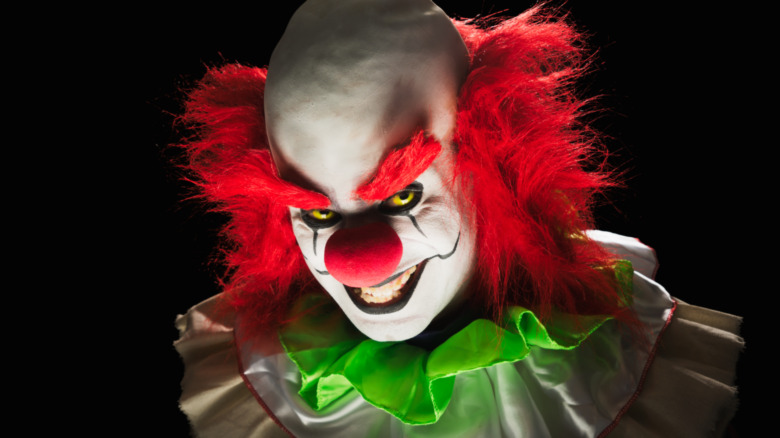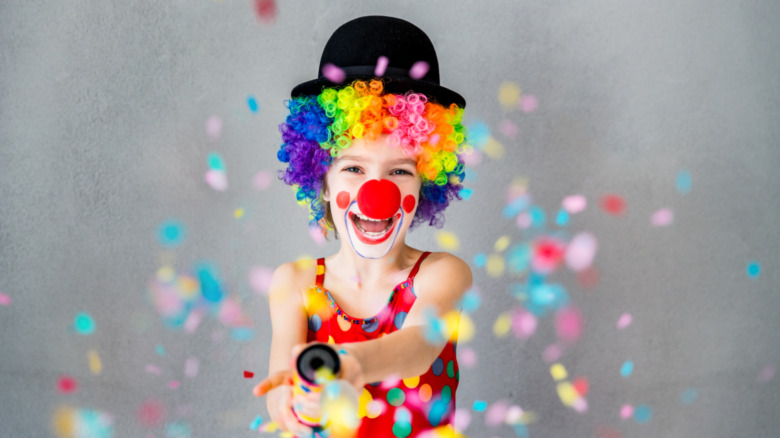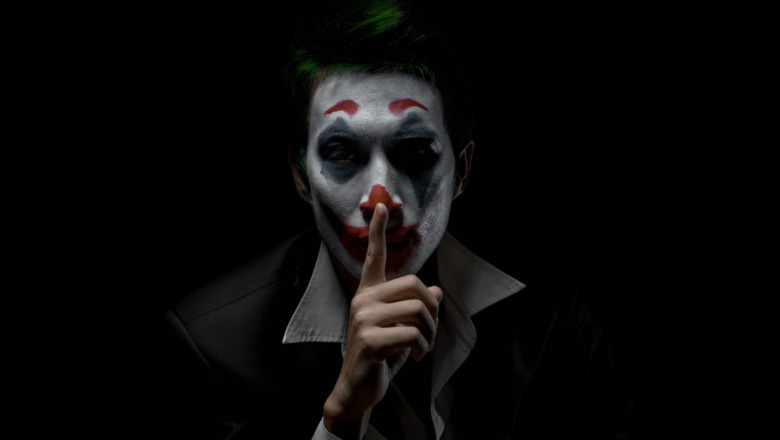Coulrophobia: The Truth About The Fear Of Clowns
Clowns as we know them have been around for two centuries, give or take, although the origins of the art form go back thousands of years. However, like acid jazz or Polish avant-garde cinema, not everyone enjoys clowns — and that's okay. To each their own, as the old saying goes.
However, for some people, clowns provoke a much more serious reaction. As Healthline reports, for some people, clowns cause such fear that the victims experience nausea, accelerated heart rate, sweating, or other symptoms typically associated with intense terror. The condition has its own name: "coulrophobia." The "-phobia" part of the word is simple enough: it means "fear of," in much the same way that "arachnophobia" means "fear of spiders." The "coulro-" part comes from a Greek word that refers to a person who walks on stilts.
Here are some key facts you need to know about coulrophobia: the fear of clowns.
The fear of clowns may result from the belief that a clown is hiding something
So what is it about clowns, which are ostensibly a form of children's entertainment, that can strike fear in up to eight percent of Americans (according to Healthline)? Psychologist Dr. Rami Nader told Time that part of the reason clowns instill fear is because they wear makeup. That face paint effectively disguises the person wearing it. "You have a clown with a painted face and a big smile, but you don't really know what they're actually feeling. There's this inherent mistrust that what they're presenting to you isn't what they're actually feeling," he said.
Similarly, as Britannica author Amy Tikkanen notes, the exaggerated facial characteristics of clown makeup portray the performer as human, yet simultaneously, vaguely "off" to the human brain. What's more, clowns are, by their very nature, impish, unpredictable, and prone to pranks. "Are they going to squirt water at you or give you a flower?"
Popular culture has leaned heavily into the idea of the evil clown
The horror genre — whether in movies, TV, literature, comic books, or elsewhere — has leaned into the trope of clowns being scary and taken it to the extreme. As we know, there have been actual "killer clowns," such as murderer John Wayne Gacy, who performed as a clown when not murdering young men.
Psychology professor Frank T. McAndrew told Time that, for some, the association between clowns and evil is a permanent one. "When people hear 'clown,' the first associations that pop into their head are the killer clowns in the movies — 'It,' 'The Joker' — and then John Wayne Gacy, the real-life mass murderer," he said.
Similarly, psychiatrist Robert Gerstman noted that, in the movie industry, there's a precedent for exaggerating a source of fear for a plot, only to have it turn into a real psychological problem in the general public.
"A good example of this is that after seeing 'Jaws,' many people were hesitant to go back in the water — even though they'd never seen a shark attack in real life," he said (via Geisinger Health System).
Clowns + hospitals + sick children = bad idea
Coulrophobia isn't just an abstract concept to be discussed in psychological circles. For hospitals, it's a real problem that has forced administrators to rethink how they decorate children's wards and entertain sick children.
For example, as NBC News reported, in one study, 250 children were asked how they would feel about decorating a pediatric ward with clown-related imagery. The kids were unanimous in their disapproval of the idea, said Dr. Penny Curtis. "We found that clowns [were] universally disliked by children. Some found them quite frightening and unknowable," Dr. Curtis said.
Similarly, in an academic paper from the European Journal of Pediatrics (posted at Springer Link), a group of researchers looked into the practice of clown performers cheering up sick kids at an Israeli hospital. The study found that a not insignificant number of kids weren't feeling it.
"Children who experienced significant fear of clowns also experienced significant fear of encountering or thinking about a [clown performer] visit," the study noted dryly.



